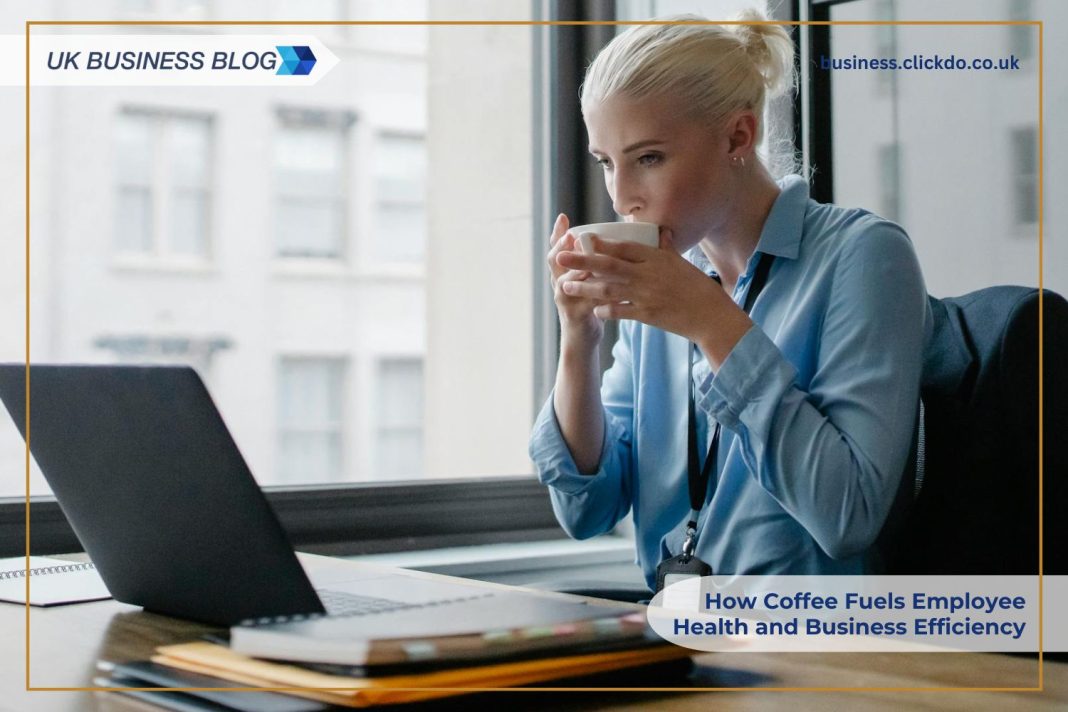Table of Contents
Over the past few decades, coffee has become an indispensable part of modern office life.
Once a tea-centric nation, the UK has fully embraced coffee culture, with office workers frequently turning to it for a quick energy boost or a moment of relaxation.
As businesses strive to create healthier, more productive work environments, coffee machines have proven to be more than just a convenient amenity; they are a catalyst for improving employee wellbeing and boosting business outcomes.
Coffee’s Positive Impact on Health and Wellbeing

There is plenty of research out there that highlights the many health benefits associated with moderate coffee consumption. Far from being a mere indulgence, coffee has been shown to lower the risk of several serious health conditions, such as:
- Lowering the risk of type 2 diabetes
- Reducing the risk of Alzheimer’s disease
- Lessening the risk of heart disease
- Reducing the risk of Multiple Sclerosis
- Protecting against cirrhosis of the liver
Beyond these benefits, coffee may also reduce the risk of certain cancers, improve liver function, and enhance cognitive performance. For businesses, offering high-quality coffee to employees not only improves their physical health but also contributes to mental clarity and focus throughout the workday.
Coffee and Productivity: The Science Behind the Brew
Caffeine is well-known for its ability to increase alertness and concentration. In an office setting, these effects translate into improved employee mood and productivity. Studies have shown that even small amounts of caffeine can enhance cognitive function and performance on tasks that require sustained attention, complex problem-solving, and creativity. Moreover, caffeine’s role in blocking adenosine—a neurotransmitter that promotes sleep—helps employees remain engaged and alert, particularly during afternoon slumps.
However, the benefits of coffee go beyond just its chemical properties. Regular breaks for a cup of coffee create natural opportunities for employees to socialise, recharge, and step away from their desks, which can prevent burnout and reduce stress. In fact, providing employees with a communal space to grab a coffee can foster better workplace relationships and collaboration.
The Workplace Coffee Revolution

The surge in coffee’s popularity in offices coincides with a broader workplace shift towards prioritising employee satisfaction and wellbeing. As businesses move towards more flexible, employee-centric cultures, offering barista-level coffee at the workplace has become an expected norm. Research reveals that nearly 50% of employees are dissatisfied with their current office coffee setup, with a significant portion choosing not to drink coffee at work due to its poor quality.
This dissatisfaction can negatively affect employee morale, particularly in industries where quality coffee is seen as a mark of a high-standard workplace. As employees increasingly compare their office coffee to the offerings at their local cafes, businesses need to up their game to meet expectations.
Enhancing Employee Experience with Office Coffee Solutions
Investing in a quality office coffee machine can be a simple yet effective way to improve the overall employee experience. By offering a variety of coffee options—ranging from creamy cappuccinos and frothy lattes to strong espressos—businesses can create a workplace atmosphere that encourages relaxation and creativity. On top of this, having access to good coffee can reduce the need for employees to leave the office to visit external cafes, saving time and enhancing productivity.
Coffee machines that offer specialty drinks or accommodate dietary preferences, such as plant-based milk options, can also help create a more inclusive workplace culture. Employees are more likely to feel valued and appreciated when their individual preferences are considered, contributing to higher levels of job satisfaction and employee retention.
Sustainability and the Ethical Coffee Trend

As more businesses align their values with sustainability goals, the choice of coffee becomes increasingly important. Ethical sourcing of coffee beans—such as those certified by the Rainforest Alliance or Fairtrade—ensures that the coffee consumed in the workplace is not only high-quality but also environmentally and socially responsible.
Choosing sustainable coffee options helps businesses reinforce their commitment to corporate social responsibility (CSR) and sustainability.
Conclusion
Incorporating high-quality coffee machines into the workplace can have far-reaching effects on employee wellbeing, satisfaction, productivity, and ultimately, the bottom line. Beyond the health benefits, providing good coffee shows a business’ commitment to creating a positive and healthy work environment where employees feel energised, appreciated, and more efficient. Whether fostering team collaboration or enhancing focus on individual tasks, coffee serves as a small but impactful part of the office culture.
For businesses looking to support employee health, improve performance, and boost their profitability, investing in a top-tier coffee machine is a step in the right direction—one that can pay dividends in both productivity and employee satisfaction. As the workplace continues to evolve, providing an excellent coffee experience can be one of the simplest yet most effective ways to boost both business success and worker wellbeing.
Author Profile
- Blogger and Educator by Passion | Senior Online Media & PR Strategist at ClickDo Ltd. | Contributor to many Education, Business & Lifestyle Blogs in the United Kingdom & Germany | Summer Course Student at the London School of Journalism and Course Instructor at the SeekaHost University.
Latest entries
 BusinessFebruary 1, 2026Why Modern Warehouse Management is the Secret to UK Retail Growth
BusinessFebruary 1, 2026Why Modern Warehouse Management is the Secret to UK Retail Growth BusinessDecember 2, 2025How to Build an Effective Progression Plan in Your Company
BusinessDecember 2, 2025How to Build an Effective Progression Plan in Your Company BusinessOctober 24, 2025Legionella Risk Assessment: 5 Things Every Entrepreneur Needs to Know
BusinessOctober 24, 2025Legionella Risk Assessment: 5 Things Every Entrepreneur Needs to Know EmploymentSeptember 2, 2025Why Motorbike Accident Staff Claims are a Growing Business Risk
EmploymentSeptember 2, 2025Why Motorbike Accident Staff Claims are a Growing Business Risk





